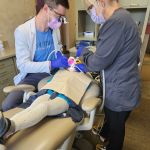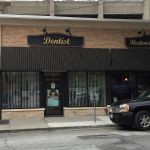How to Prevent a Tooth Abscess from Recurring
Dealing with a tooth abscess can be a painful and unsettling experience. If you've experienced one in the past, you're likely eager to prevent it from happening again. The good news is that with proper care and attention to oral hygiene, the risk of developing another abscess can be significantly reduced. In this article, I’ll walk you through the steps you can take to prevent a tooth abscess from recurring, and I’ll also share some personal experiences and insights to make this process more understandable.
1. Understanding What Causes a Tooth Abscess
Before we dive into prevention, it's important to understand what a tooth abscess is. A tooth abscess is essentially a pocket of pus that forms at the tip of a tooth’s root due to a bacterial infection. This infection can occur when a cavity, gum disease, or a cracked tooth allows bacteria to penetrate the tooth or gum, leading to an abscess.
From my experience, many people don’t realize that even a small cavity can lead to serious issues if it’s left untreated. I once had a small cavity I ignored for months, thinking it wasn’t a big deal—until it resulted in an abscess, which was incredibly painful. Recognizing the potential consequences of neglecting oral health is a crucial first step in preventing future abscesses.
2. Maintain Proper Oral Hygiene
Brushing and flossing regularly is the most important thing you can do to prevent a tooth abscess. Regular cleaning helps remove food particles and plaque, which can otherwise contribute to the growth of harmful bacteria in the mouth.
When I was first dealing with recurring abscesses, I discovered that brushing twice a day and flossing thoroughly each night made a huge difference. Using toothpaste with fluoride helps protect the enamel, and flossing ensures that areas between your teeth, where bacteria tend to hide, are cleaned effectively.
Remember, it's also essential to change your toothbrush every 3 to 4 months, as old bristles can become ineffective at cleaning. I also recommend using a mouthwash that fights bacteria, as it can offer extra protection against infections.
3. Regular Dental Check-ups
Regular visits to the dentist are vital to ensuring your teeth stay healthy and free from infection. Dentists can spot early signs of issues, like cavities or gum disease, and treat them before they develop into something more serious. It's easy to overlook dental appointments, but scheduling them regularly can save you from much more pain and discomfort in the long run.
I once skipped a dental appointment because I felt fine, only to find out during my next visit that I had a cavity that had developed into a full-blown abscess. Learning from that experience, I now make sure to visit my dentist every six months for a routine cleaning and exam, which has helped me avoid any more abscesses.
4. Treat Cavities and Gum Disease Early
Cavities and gum disease are common causes of tooth abscesses. If you have a cavity, get it treated as soon as possible. The same goes for gum disease—gingivitis and periodontitis can leave your gums vulnerable to infections, leading to abscess formation. If left untreated, these conditions can cause severe tooth decay and increase your risk of abscesses.
After experiencing an abscess, I learned that keeping my gums healthy by brushing gently along the gum line and using an antimicrobial mouthwash made a noticeable difference. If you notice any bleeding when brushing or your gums seem swollen, it’s essential to seek treatment before an abscess can form.
5. Drink Plenty of Water and Avoid Sugary Drinks
Hydration plays a significant role in oral health. Drinking water helps wash away food particles and bacteria that could contribute to tooth decay. Additionally, avoiding sugary drinks like soda and sweetened coffee can prevent plaque buildup and reduce the likelihood of developing cavities and abscesses.
I've personally switched to drinking water throughout the day, and I've noticed that it not only helps with my oral health but also keeps my breath fresh and my teeth cleaner. The simple act of sipping water between meals can really go a long way in maintaining good oral hygiene.
6. Addressing Underlying Health Conditions
Certain underlying health conditions, such as diabetes, can make you more prone to infections, including tooth abscesses. If you have a condition that affects your immune system or your ability to heal, it’s even more important to stay on top of your oral care routine and visit your dentist regularly.
I’ve spoken with several people who’ve had recurring abscesses linked to diabetes, and their dentists emphasized the importance of managing their blood sugar levels. If you have any health concerns, it’s always worth discussing them with both your doctor and dentist to prevent any complications that could lead to abscesses.
7. Consider Using a Soft-Bristled Toothbrush
Using a toothbrush with soft bristles is essential, especially if you have sensitive teeth or gums. Hard-bristled toothbrushes can irritate your gums, causing them to bleed or recede, which can create an environment where bacteria can thrive. I’ve learned the hard way that a gentle approach is best when brushing to avoid harming the gums and teeth.
A soft-bristled brush will effectively clean your teeth without damaging your gums. For added protection, consider using an electric toothbrush, which has been shown to remove plaque more efficiently than manual brushing alone.
8. Avoid Smoking
Smoking is a major risk factor for tooth abscesses. It not only weakens your immune system but also promotes plaque and tartar buildup, both of which can contribute to infections. If you smoke, quitting or reducing your tobacco intake can significantly improve your oral health.
After I quit smoking, I noticed that my teeth and gums felt much healthier. The frequency of my dentist visits for issues like gingivitis and plaque buildup has dramatically decreased, and I haven’t had any issues with abscesses since then.
By following these steps and paying attention to the health of your teeth and gums, you can prevent tooth abscesses from recurring. Remember, it’s all about regular care, early treatment, and maintaining a healthy lifestyle. If you ever experience symptoms of a tooth abscess, make sure to see your dentist promptly to avoid complications.
SEO Title: Best Ways to Prevent a Tooth Abscess from RecurringSEO Keywords: prevent tooth abscess recurring, tooth abscess prevention, oral health care, how to avoid tooth abscess, dental health, oral hygiene tipsSEO Description: Learn the best ways to prevent a tooth abscess from recurring with tips on oral hygiene, regular dental visits, and healthy lifestyle choices. Get expert advice now.






 Dr. Marvin R. Winter, DDS5.0 (9 review)
Dr. Marvin R. Winter, DDS5.0 (9 review) Affordable Dentures & Implants4.0 (502 review)
Affordable Dentures & Implants4.0 (502 review) Southill Dental Group5.0 (364 review)
Southill Dental Group5.0 (364 review) Comfort Dental Whitehall - Your Trusted Dentist in Columbus4.0 (611 review)
Comfort Dental Whitehall - Your Trusted Dentist in Columbus4.0 (611 review) Ivy Dental of Fleetwood4.0 (9 review)
Ivy Dental of Fleetwood4.0 (9 review) Advanced Dental Designs4.0 (305 review)
Advanced Dental Designs4.0 (305 review) The Importance of Oral Health Education During Pregnancy for a Healthy Pregnancy
The Importance of Oral Health Education During Pregnancy for a Healthy Pregnancy Best Tips for Brushing Your Teeth Properly for Healthy Gums: Essential Techniques for Oral Health
Best Tips for Brushing Your Teeth Properly for Healthy Gums: Essential Techniques for Oral Health Why Skipping Dental Checkups Can Lead to Bigger Oral Health Problems
Why Skipping Dental Checkups Can Lead to Bigger Oral Health Problems Advantages of Porcelain Dental Restorations
Advantages of Porcelain Dental Restorations How Can Diabetes Cause Tooth and Gum Problems? Preventing and Managing Oral Health Issues
How Can Diabetes Cause Tooth and Gum Problems? Preventing and Managing Oral Health Issues Healthy Habits for Promoting Good Oral Health and Hygiene: Tips for a Healthy Smile
Healthy Habits for Promoting Good Oral Health and Hygiene: Tips for a Healthy Smile